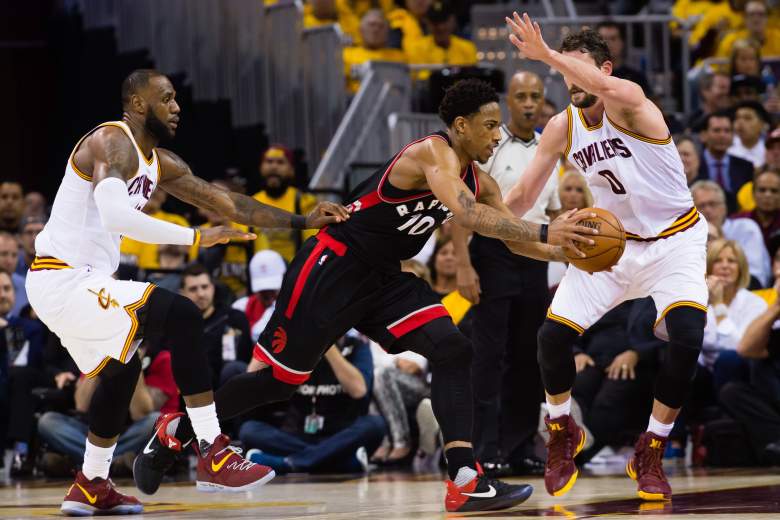
CLEVELAND, OH - MAY 1: DeMar DeRozan #10 of the Toronto Raptors drives around LeBron James #23 and Kevin Love #0 of the Cleveland Cavaliers during the second half of Game One of the NBA Eastern Conference semifinals at Quicken Loans Arena on May 1, 2017 in Cleveland, Ohio. The Cavaliers defeated the Raptors 116-105. NOTE TO USER: User expressly acknowledges and agrees that, by downloading and or using this photograph, User is consenting to the terms and conditions of the Getty Images License Agreement. (Photo by Jason Miller/Getty Images)
Mental health in professional sports is now taken seriously.
Earlier this month, the NBA implemented mental health policies for the 2019-20 season which requires teams to have at least one mental health professional on retaine and have a licensed psychiatrist available to help manage any mental health concerns.
The San Antonio Spurs’ DeMar DeRozan and Cleveland Cavaliers’ Kevin Love have become faces of the NBA’s mental health initiatives.
While this is a big step for the NBA, all are not impressed.
Insert Royce White who now plays in Ice Cube’s Big 3 Basketball League.
The 16th pick by the Houston Rockets in the 2012 NBA Draft, Royce White didn’t play for the Rockets in his rookie season.
For those keeping score at home: White missed the opening of NBA camp on because of his desire to have a contractual plan put in place with the Rockets and the NBA that addressed the league wide mental health policy or lack thereof. White requested permission to travel by bus when necessary in order to limit his flight schedule. The Rockets and White came to an agreement regarding travel, including allowing White travel by personal bus rather than flying which has been an anxiety trigger in the past for him.
White missed the first week of training camp before this agreement was put in place. White later said that the Houston Rockets’ management is “unqualified” to make determinations about his health because they are not mental health professionals and has said the franchise has been “inconsistent” in its support of him.
“The problem that the NBA is having fundamentally with the mental health issue is that the leaders whether that be the owners or the people in the front office sees every issue on the table as a power struggle between them and the players,” Royce White told Fanactics View over the weekend in Dallas, Texas.
Royce White’s comentary was transcribed by Dallas Mavericks beat reporter, Landon Buford:
“So, for example, this exact same policy we implemented into the Big 3, the push back that I got back for trying to have it in the was that NBA players would fake mental illness. What an egregious thing to say and it absolutely is. It is a very nasty thing to say to suggest some of the most competitive athletes in the world would use mental health, which is one of the most stigmatized heath conditions in the world to get out of playing but still gets paid.
“Basically, what they are saying there’s a con like culture amidst the players. You are talking about players that are walking through right here. People who have put years, hours, blood, sweat, and tears into the NBA, and you know what I told them in response to that? F*** Y’all, and that is why I am not in the NBA.” Because I took offense for every man walking back that has put that jersey on in the NBA.”
More NBA players are addressing mental health. Retired NBA player, Jason Caffey, 46, recently authored a book with Nadine Pierre-Louis geared for young men called “Richard and The Boyz: The Puberty Experience.”
Appearing on the Scoop B Radio Podcast, Caffey, the Chicago Bulls’ 20th pick in the 1995 NBA Draft averaged 7.3 points per game during the Bulls’ second consecutive championship run in 1996–97. While on the podcast, he discussed Dennis Rodman. “He was just different,” Caffey told me of Rodman.
“I can’t go into analyzing him psychologically because I’m not a doctor but what you and I spoke on yesterday. I told you some things that could be possibly true because I suffer from some of it. Speaking for myself you know back then in the league [NBA] if you had a mental illness nobody really cared or had enough knowledge to know what was going on. Nobody cared you were straight or crazy. Dennis was always considered crazy by so many people just because of the image he gives. He’s a very smart man. In no way shape or form was he crazy but he has his own ways to do things.”